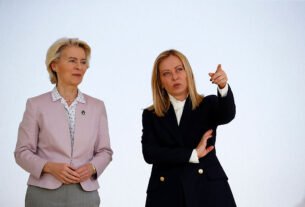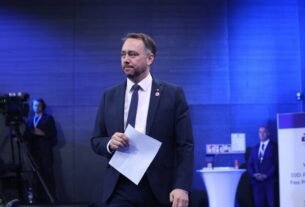“Allied consultations have taken the form of a formal request to invoke Article 4 of the North Atlantic Treaty”, the Polish Chancellery wrote.
Article 4 is invoked when a country believes “the territorial integrity, political independence or security of any of the Parties is threatened” and deems a discussion on the matter necessary, the Treaty explains.
The consultation process is a necessary step before the members of the military alliance decide to take any action against threats, and especially before invoking the Article 5, the mutual defence clause.
The last time Article 4 was invoked was on 24 February 2022, on the day of Russia’s invasion of Ukraine.
Warsaw decided against starting the consultation process in November 2022, when two people were killed in an explosion in a village close to the border, though the leadership toyed with the idea.
What happened?
Poland said Wednesday NATO allies had scrambled aircraft alongside allies to shoot down “hostile objects” violating its airspace during a Russian attack on neighbouring Ukraine, a first for a NATO country during the war.
“Aircraft have used weapons against hostile objects,” Polish Defence Minister Władysław Kosiniak-Kamysz said on social media, adding: “We are in constant contact with NATO command.”
Russian objects have entered the airspace of NATO members – including Poland, Romania, and the Baltic States – several times during Russia’s three-and-a-half-year war, but a NATO country has never attempted to shoot them down.
The operational command of Poland’s military slammed the “unprecedented” airspace violations, saying it had spotted around a dozen drone-type objects, some of which were shot down.
“This is an act of aggression that has created a real threat to the safety of our citizens,” it said.
The incursion came as Russia unleashed a barrage of strikes across Ukraine, including in the western city of Lviv, around 80 kilometres from the Polish border.
Ukraine had warned that Russia’s leader was “testing the West” and called for its allies to mount a strong response or risk Russian drones flying “even further into Europe”.
‘An extremely dangerous precedent’, Zelenskyy
Ukrainian President Volodymyr Zelenskyy said Wednesday that eight Russian drones were “aimed toward” Poland in an overnight barrage launched by Moscow that forced Warsaw to scramble air defences.
“It was not just one Shahed that could be called an accident, but at least eight strike drones aimed toward Poland,” Zelenskyy said, referring to Iranian-designed drones deployed by Moscow, adding that the incident represented “An extremely dangerous precedent for Europe.”
Ukraine’s Foreign Minister Andrii Sybiha wrote on X that the incursion showed “that (Russian President Vladimir) Putin’s sense of impunity keeps growing because he was not properly punished for his previous crimes”.
“Putin just keeps escalating, expanding his war, and testing the West,” Sybiha said. “The longer he faces no strength in response, the more aggressive he gets.”
EU reaction
The EU’s top diplomat Kaja Kallas said Wednesday that Russia appeared to have intentionally violated Polish airspace, after Warsaw scrambled jets to shoot down drones.
“Last night in Poland we saw the most serious European airspace violation by Russia since the war began, and indications suggest it was intentional, not accidental,” Kallas wrote on X.
“The EU stands in full solidarity with Poland. Russia’s war is escalating, not ending,” Kallas wrote.
European Commission Ursula von der Leyen today also proposed to create a “drone wall” on the Eastern flank to monitor border countries in her annual State of the EU speech.
Updates: This article has been updated as the story develops, to include reactions and Poland’s activation of Article 4 of the NATO Treaty.
(cp)




